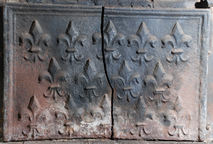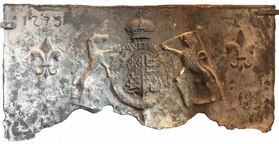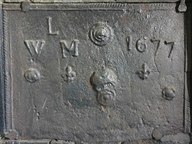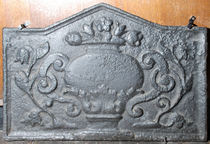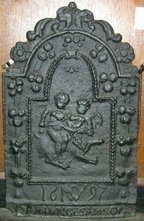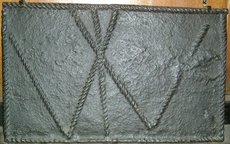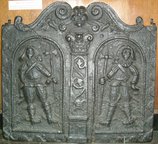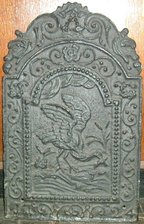-
75
Description: Rectangular; ovolo moulded edging (top and sides); 14 impressions of a fleur de lys, arranged in three horizontal rows (5-4-5), carefully spaced.
Notes: The same fleur de lys stamp has been noted on several firebacks, indicating a common source.
- Decoration tags:
- rectangular (shape)
- ovolo (edging)
- carved stamps
- heraldic
Manufactured: in the mid- to late-16th century possibly at Pounsley Furnace, Framfield in the Weald area of England.
Current location: in private hands, Groombridge, East Sussex, England.
- Attached to series:
- Pounsley series
-
1226
Description: Rectangular; rope edging (top & sides); in centre, Tudor shield, garter, crown and supporters (greyhound and lion) between two fleurs-de-lys; date top left.
Notes: A badly corroded fireback. The armorial achievement is seen on other firebacks and was formed from four separate stamps; the supporters are consistent with the date; the style of the numerals is uncharacteristic of the period. The sharpness of the detail on the crown and upper part of the Garter indicates that the fireback is contemporary with the date, and not older as similar examples seem to be. The same date in identical form is on a similar fireback at Penshurst Place, Kent (no. 515).
Inscription: 1579 / [Garter motto incomplete]
Arms: Tudor royal (prob. Elizabeth I)
- Decoration tags:
- rectangular (shape)
- rope (edging)
- carved stamps
- date stamp
- heraldic
- armorial
- text
- animals
Manufactured: in the late-16th century in the Weald area of England.
Current location: Groombridge Place, Speldhurst, Kent, England.
-
306
Description: Rectangular; twisted rope edging (top and sides) with a fillet inside; top centre, concentric roundel with rose-and-crown below; top left, initials in triad with small rose below 'W' and small fleur-de-lys below 'M'; upper right, date with small fleur below '6' and small rose lower, below second '7'.
Notes: The style of rose and crown is similar to that used in gun founding in the Tudor period, suggesting that the furnace that was the source of this fireback may have been used for that purpose.
Inscription: WLM [triad] 1677
- Decoration tags:
- rectangular (shape)
- rope (edging)
- carved stamps
- individual letters
- individual numbers
- heraldic
- text
- objects
Manufactured: in 1677 in the Weald area of England.
Current location: in private hands, Speldhurst, Kent, England.
- Attached to series:
- 1660s-90s Wealden series
- Fleur-de-lys firebacks
-
83
Description: Arched rectangular shaped central panel, bead-and-pellet edging, semi-naked male figure, wearing a floral head-dress and carrying a basket of produce, initials in top corners; arched rectangular shaped border, fillet edging, symmetrical festoons of foliage, floral scrolls at base, date in an oval cartouche; on top, two putti, two dolphins and scrolled foliage, all symmetrical.
Notes: An allegory of Spring, based closely on an engraving, dated 1600, by Hendrik Goltzius (1558-1617); one of a series of large firebacks of similar date, all bearing the initials, GK.
Copies of this fireback are known.
Inscription: G K / 1700
- Decoration tags:
- 'Dutch' (shape)
- fillet (edging)
- whole carved pattern
- individual letters
- date stamp
- pictorial
- allegorical
- text
- humans
Manufactured: in 1700 possibly in the Siegerland area of Germany.
Current location: Guildford Museum, Guildford, Surrey, England.
Museum number: S,7111 (part of the Guildford Museum museum group)
Citation: Pesch, D., 1982, Herdgussplatten (Rheinland-Verlag, Koln).
- Attached to series:
- 'Dutch' GK series
-
76
Description: Rectangular with ‘portico’ arch; cavetto edging; two-handled vase, flower stems on each side entwined round handles; flowers emerging from top of vase; base of vase overlaps the edging.
Notes: One of a varied group of small firebacks with bold, simple designs and cavetto edging; formerly in the possession of Gertrude Jekyll, Munstead Wood, near Godalming, Surrey.
- Decoration tags:
- rectangular with triangular arch (shape)
- cavetto (edging)
- whole carved pattern
- plants
- objects
Manufactured: in the mid-17th century possibly in the Weald area of England.
Current location: Guildford Museum, Guildford, Surrey, England.
Museum number: S.7129 (part of the Guildford Museum museum group)
Citation: Jekyll, G., 1903, Old West Surrey, London, Longmans.
- Attached to series:
- Small cavetto series
-
77
Description: 'Dutch' style; arched rectangular shaped central panel, bead edging, two children sitting astride a beast (possibly a winged ram); arched rectangular shaped border, fillet edging, swags of fruit bunches suspended from ribbon; on top, symmetrical floral swirls and flowers.
Notes: The image is probably intended to be Phrixus and Helle riding the winged ram with the golden fleece, but in recasting it has been misinterpreted as the young Samson slaying the lion at Timnath; Judges 14: 5-6.
Copies of this fireback are known.
Inscription: 16 NDW 97 / DER JUNGE SAMSON [the young Samson]
- Decoration tags:
- 'Dutch' (shape)
- fillet (edging)
- whole carved pattern
- individual letters
- individual numbers
- biblical
- monogram
- text
- humans
Manufactured: in the late-17th to early-18th century possibly in the Weald area of England.
Current location: Guildford Museum, Guildford, Surrey, England.
Museum number: G.486 (part of the Guildford Museum museum group)
- Attached to series:
- 'Dutch' NDW series
-
78
Description: Sub-rectangular; twisted rope edging; lengths of twisted rope arranged to form two 'V' shapes and an 'I' overlapping to forma possible monogram.
Notes: The 'monogram' comprises different length pieces of rope and may have an apotropaic significance, the double 'V' referring to the Virgin Mary.
- Decoration tags:
- rectangular (shape)
- rope (edging)
- simple stamps
- apotropaic
- objects
Manufactured: in the 16th century in the Weald area of England.
Current location: Guildford Museum, Guildford, Surrey, England.
Museum number: G.488 (part of the Guildford Museum museum group)
- Attached to series:
- Rope design firebacks
-
81
Description: Rectangular with two mirrored scrolls on top, a lion’s face between; bas-relief semi-circle edging (sides and bottom); central pilaster with vine scrolling, Corinthian capital, initials on the pedestal; on either side, an arched alcove, each with a halberdier in mid-17th century clothes, their feet pointing to the middle.
Notes: Stylistically similar to the Lenard fireback (no. 429), the initials also appear on other firebacks. All known examples of this fireback are poorly modelled and cast. A rare version (no. 400) has different edging and lacks the pattern-maker’s initials. Inferior copies of this fireback were advertised in Kings Worthy Foundry's (Winchester) catalogue in the mid-20th century.
Copies of this fireback are known.
Inscription: IM
- Decoration tags:
- rectangular with ornate arch (shape)
- fillet (edging)
- whole carved pattern
- planklines
- pictorial
- architectural
- text
- humans
Manufactured: in the early- to mid-17th century possibly at Brede Furnace in the Weald area of England.
Current location: Guildford Museum, Guildford, Surrey, England.
Museum number: S.7108 (part of the Guildford Museum museum group)
Citation: Lloyd, N., 1925, 'Domestic Ironwork I', Architectural Review, 58, pp. 58-67.
- Attached to series:
- IM series
- Brede group
-
82
Description: 'Dutch' style; arched rectangular shaped central panel, bead on fillet edging, naturalistic scene of a heron with wings extended catching a fish, water below, clouds above, plants in background; arched rectangular shaped border, fillet edging, symmetrical scrolled tendril pattern; at bottom, two looped 'W' figures between date split corners; on top, symmetrical scrolled foliage. A single central vertical plankline.
Notes: The image of the heron is taken from a print, by Wenceslaus Hollar c.1658, of an etching by Francis Barlow (c.1626-1704); the style of the date suggests a similar pattern maker to a series of firebacks, of the same date, some bearing a Welsh inscription. All incorporate the looped 'W' motif which may be intended to identify the pattern maker. The small size of this fireback makes it likely that it was intended to be fixed to the back of a grate.
Copies of this fireback are known.
Inscription: 17 24
- Decoration tags:
- 'Dutch' (shape)
- fillet (edging)
- whole carved pattern
- planklines
- pictorial
- text
- animals
Manufactured: in 1724 in England.
Current location: Guildford Museum, Guildford, Surrey, England.
Museum number: G.487 (part of the Guildford Museum museum group)
- Attached to series:
- 1724 series
- British 'Dutch' style firebacks
-
84
Description: Arched rectangular shape; ‘egg and dart’ ovolo moulding visible on top and sides; shield, helmet, crest, mantling and supporters of the Mohun family.
Notes: Cast from a finely carved pattern, the supporters denote these are the arms of a peer. The crest is: Gules, a maunch ermine, with a hand proper holding a fleur de lys or. Egg and dart moulding is rare and examples (at Maidstone and Burwash) may be the work of the same pattern maker. From Sidney Farm, Alfold, Surrey; Reginald Mohun (pron. Moon) of Dedisham, Slinfold, Sussex, was husband of Elizabeth Blounte of Dedisham c.1636. Bottom missing due to corrosion.
Copies of this fireback are known.
Arms: Mohun family, barons of Okehampton
- Decoration tags:
- rectangular with round arch (shape)
- ovolo, egg and dart (edging)
- whole carved pattern
- heraldic
- armorial
Manufactured: in the early- to mid-17th century in England.
Current location: Guildford Museum, Guildford, Surrey, England.
Museum number: G.7106 (part of the Guildford Museum museum group)
- Attached to series:
- Personal armorial firebacks
- Mohun series
